University Report: Globalisation and Its Impact on the Global Economy
VerifiedAdded on 2020/05/28
|9
|1513
|144
Report
AI Summary
This report provides a comprehensive overview of Globalisation, defining it as the integration of economies through trade, technology, and manufacturing. It delves into the growth of Globalisation, examining its social, political, cultural, and legal dimensions. The report outlines four key theories of Globalisation: Realism, Liberalism, Marxism, and Constructivism, highlighting their differing perspectives on world politics. It then explores the role of Globalisation in developing countries, emphasizing its contribution to job creation, wealth generation, and economic diversification. Furthermore, the report analyzes the impacts of Globalisation on business operations, including increased competition, the introduction of new technologies, and the transfer of knowledge. The report concludes by summarizing the key aspects of Globalisation and its effects on the global economy and business practices.

Running head: GLOBALISATION
Globalisation
Name of the Student:
Name of the University:
Authors Note:
Globalisation
Name of the Student:
Name of the University:
Authors Note:
Paraphrase This Document
Need a fresh take? Get an instant paraphrase of this document with our AI Paraphraser

1GLOBALISATION
Executive Summary:
The report gives an overview on the Globalisation aspect. The report put forward a definition
of Globalisation. There is a discussion on the theories of Globalisation and its role played by
it in the country’s development. The report also focuses on the impact of Globalisation on a
country’s business operation.
Executive Summary:
The report gives an overview on the Globalisation aspect. The report put forward a definition
of Globalisation. There is a discussion on the theories of Globalisation and its role played by
it in the country’s development. The report also focuses on the impact of Globalisation on a
country’s business operation.
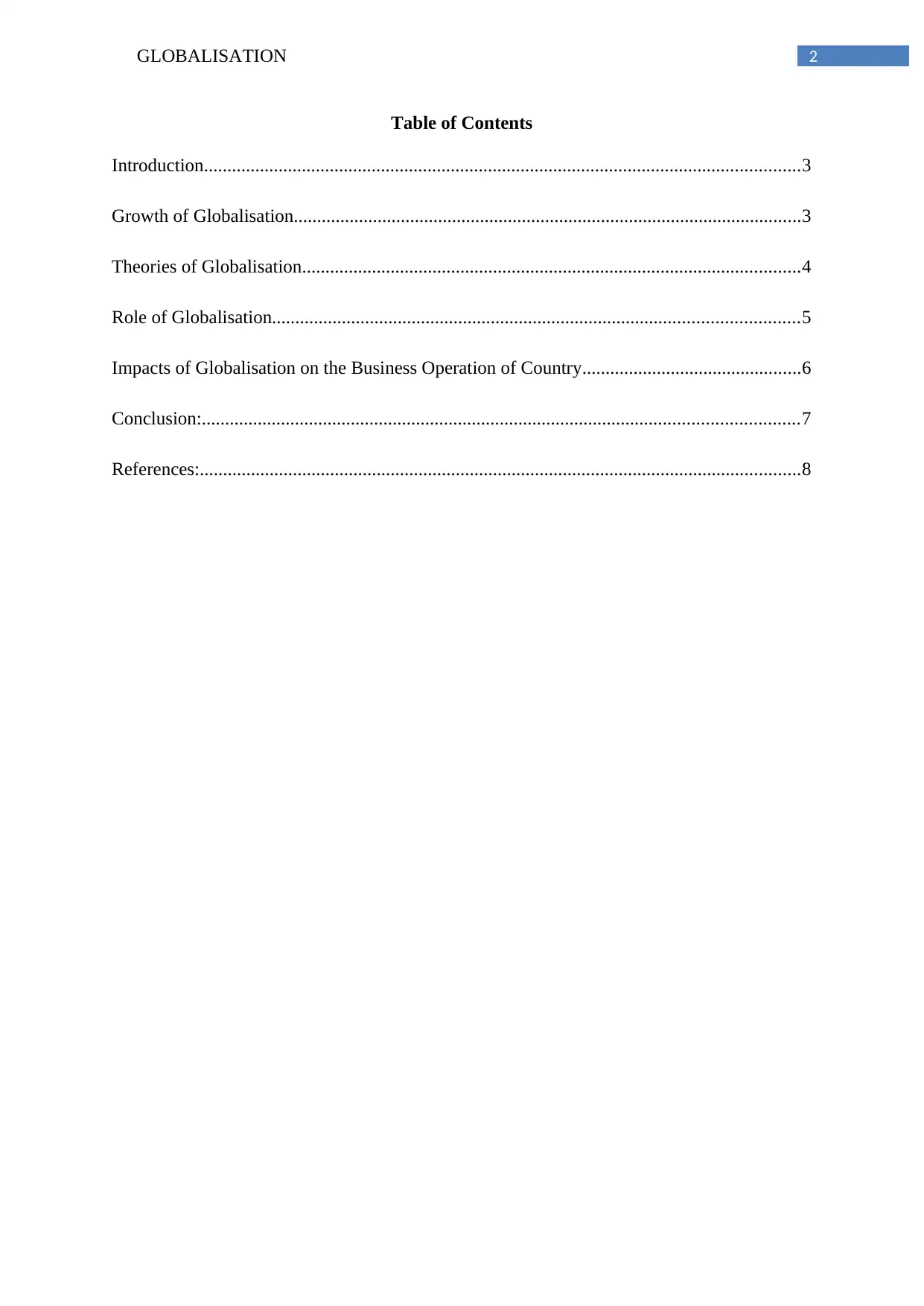
2GLOBALISATION
Table of Contents
Introduction................................................................................................................................3
Growth of Globalisation.............................................................................................................3
Theories of Globalisation...........................................................................................................4
Role of Globalisation.................................................................................................................5
Impacts of Globalisation on the Business Operation of Country...............................................6
Conclusion:................................................................................................................................7
References:.................................................................................................................................8
Table of Contents
Introduction................................................................................................................................3
Growth of Globalisation.............................................................................................................3
Theories of Globalisation...........................................................................................................4
Role of Globalisation.................................................................................................................5
Impacts of Globalisation on the Business Operation of Country...............................................6
Conclusion:................................................................................................................................7
References:.................................................................................................................................8
⊘ This is a preview!⊘
Do you want full access?
Subscribe today to unlock all pages.

Trusted by 1+ million students worldwide
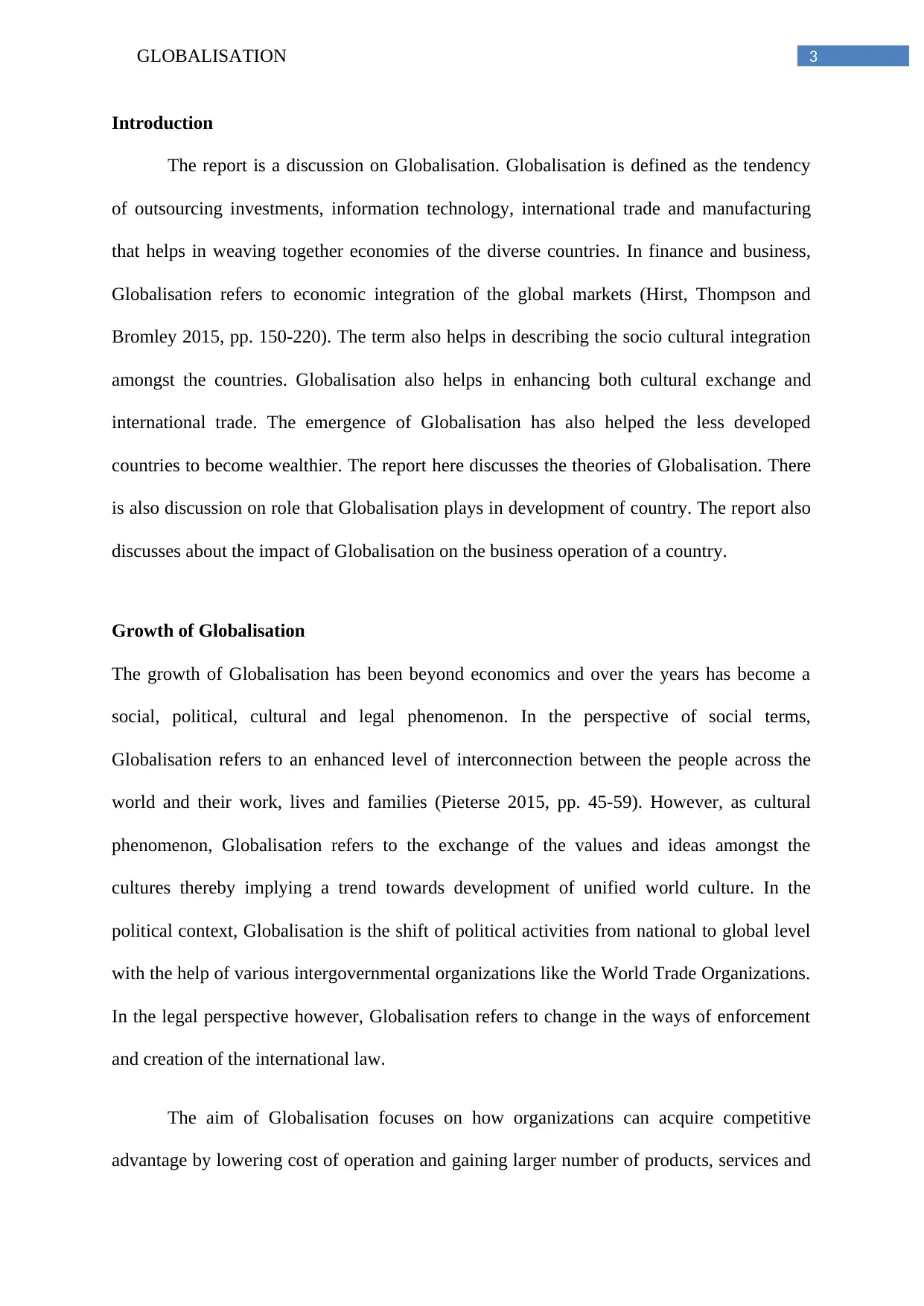
3GLOBALISATION
Introduction
The report is a discussion on Globalisation. Globalisation is defined as the tendency
of outsourcing investments, information technology, international trade and manufacturing
that helps in weaving together economies of the diverse countries. In finance and business,
Globalisation refers to economic integration of the global markets (Hirst, Thompson and
Bromley 2015, pp. 150-220). The term also helps in describing the socio cultural integration
amongst the countries. Globalisation also helps in enhancing both cultural exchange and
international trade. The emergence of Globalisation has also helped the less developed
countries to become wealthier. The report here discusses the theories of Globalisation. There
is also discussion on role that Globalisation plays in development of country. The report also
discusses about the impact of Globalisation on the business operation of a country.
Growth of Globalisation
The growth of Globalisation has been beyond economics and over the years has become a
social, political, cultural and legal phenomenon. In the perspective of social terms,
Globalisation refers to an enhanced level of interconnection between the people across the
world and their work, lives and families (Pieterse 2015, pp. 45-59). However, as cultural
phenomenon, Globalisation refers to the exchange of the values and ideas amongst the
cultures thereby implying a trend towards development of unified world culture. In the
political context, Globalisation is the shift of political activities from national to global level
with the help of various intergovernmental organizations like the World Trade Organizations.
In the legal perspective however, Globalisation refers to change in the ways of enforcement
and creation of the international law.
The aim of Globalisation focuses on how organizations can acquire competitive
advantage by lowering cost of operation and gaining larger number of products, services and
Introduction
The report is a discussion on Globalisation. Globalisation is defined as the tendency
of outsourcing investments, information technology, international trade and manufacturing
that helps in weaving together economies of the diverse countries. In finance and business,
Globalisation refers to economic integration of the global markets (Hirst, Thompson and
Bromley 2015, pp. 150-220). The term also helps in describing the socio cultural integration
amongst the countries. Globalisation also helps in enhancing both cultural exchange and
international trade. The emergence of Globalisation has also helped the less developed
countries to become wealthier. The report here discusses the theories of Globalisation. There
is also discussion on role that Globalisation plays in development of country. The report also
discusses about the impact of Globalisation on the business operation of a country.
Growth of Globalisation
The growth of Globalisation has been beyond economics and over the years has become a
social, political, cultural and legal phenomenon. In the perspective of social terms,
Globalisation refers to an enhanced level of interconnection between the people across the
world and their work, lives and families (Pieterse 2015, pp. 45-59). However, as cultural
phenomenon, Globalisation refers to the exchange of the values and ideas amongst the
cultures thereby implying a trend towards development of unified world culture. In the
political context, Globalisation is the shift of political activities from national to global level
with the help of various intergovernmental organizations like the World Trade Organizations.
In the legal perspective however, Globalisation refers to change in the ways of enforcement
and creation of the international law.
The aim of Globalisation focuses on how organizations can acquire competitive
advantage by lowering cost of operation and gaining larger number of products, services and
Paraphrase This Document
Need a fresh take? Get an instant paraphrase of this document with our AI Paraphraser
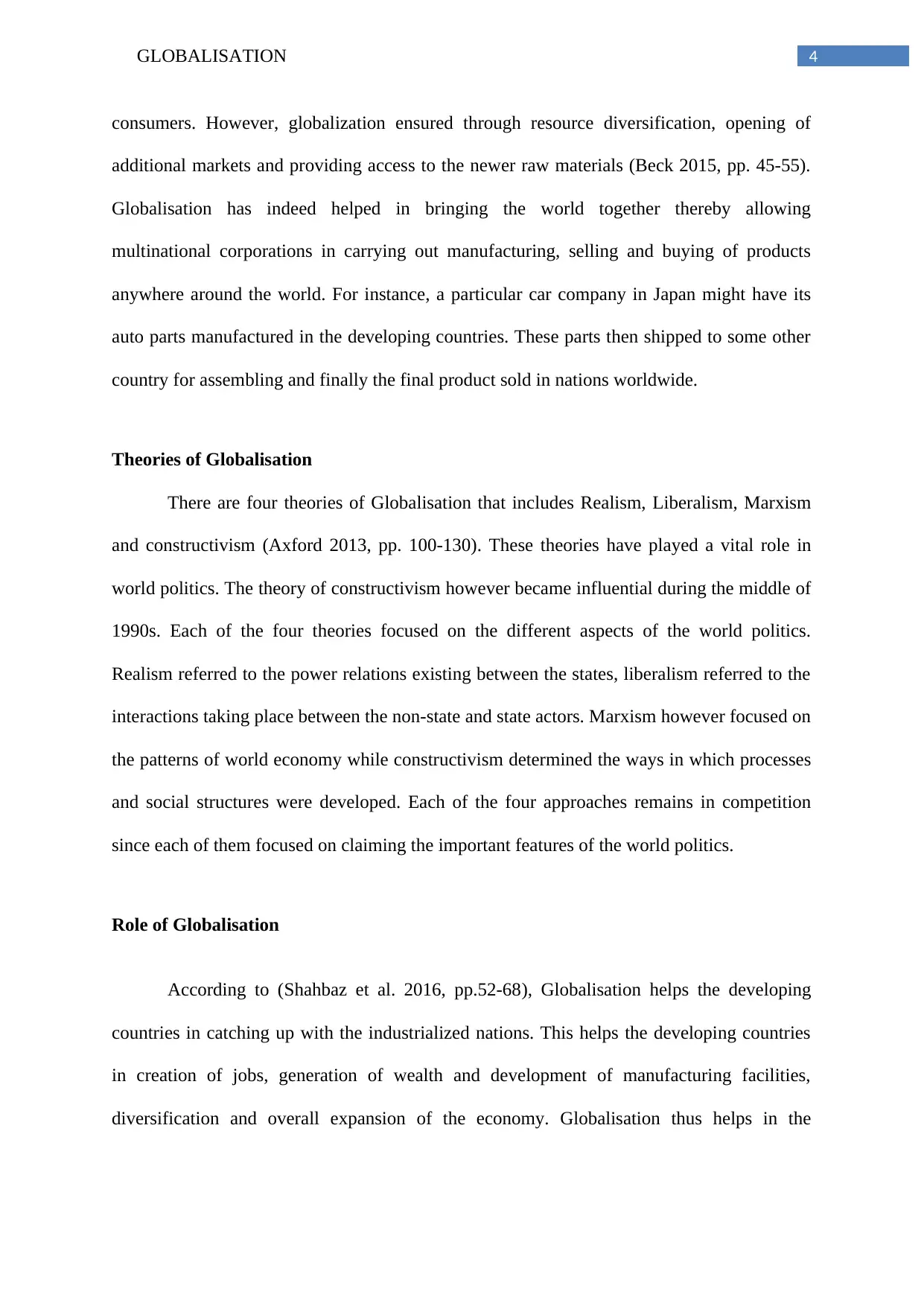
4GLOBALISATION
consumers. However, globalization ensured through resource diversification, opening of
additional markets and providing access to the newer raw materials (Beck 2015, pp. 45-55).
Globalisation has indeed helped in bringing the world together thereby allowing
multinational corporations in carrying out manufacturing, selling and buying of products
anywhere around the world. For instance, a particular car company in Japan might have its
auto parts manufactured in the developing countries. These parts then shipped to some other
country for assembling and finally the final product sold in nations worldwide.
Theories of Globalisation
There are four theories of Globalisation that includes Realism, Liberalism, Marxism
and constructivism (Axford 2013, pp. 100-130). These theories have played a vital role in
world politics. The theory of constructivism however became influential during the middle of
1990s. Each of the four theories focused on the different aspects of the world politics.
Realism referred to the power relations existing between the states, liberalism referred to the
interactions taking place between the non-state and state actors. Marxism however focused on
the patterns of world economy while constructivism determined the ways in which processes
and social structures were developed. Each of the four approaches remains in competition
since each of them focused on claiming the important features of the world politics.
Role of Globalisation
According to (Shahbaz et al. 2016, pp.52-68), Globalisation helps the developing
countries in catching up with the industrialized nations. This helps the developing countries
in creation of jobs, generation of wealth and development of manufacturing facilities,
diversification and overall expansion of the economy. Globalisation thus helps in the
consumers. However, globalization ensured through resource diversification, opening of
additional markets and providing access to the newer raw materials (Beck 2015, pp. 45-55).
Globalisation has indeed helped in bringing the world together thereby allowing
multinational corporations in carrying out manufacturing, selling and buying of products
anywhere around the world. For instance, a particular car company in Japan might have its
auto parts manufactured in the developing countries. These parts then shipped to some other
country for assembling and finally the final product sold in nations worldwide.
Theories of Globalisation
There are four theories of Globalisation that includes Realism, Liberalism, Marxism
and constructivism (Axford 2013, pp. 100-130). These theories have played a vital role in
world politics. The theory of constructivism however became influential during the middle of
1990s. Each of the four theories focused on the different aspects of the world politics.
Realism referred to the power relations existing between the states, liberalism referred to the
interactions taking place between the non-state and state actors. Marxism however focused on
the patterns of world economy while constructivism determined the ways in which processes
and social structures were developed. Each of the four approaches remains in competition
since each of them focused on claiming the important features of the world politics.
Role of Globalisation
According to (Shahbaz et al. 2016, pp.52-68), Globalisation helps the developing
countries in catching up with the industrialized nations. This helps the developing countries
in creation of jobs, generation of wealth and development of manufacturing facilities,
diversification and overall expansion of the economy. Globalisation thus helps in the
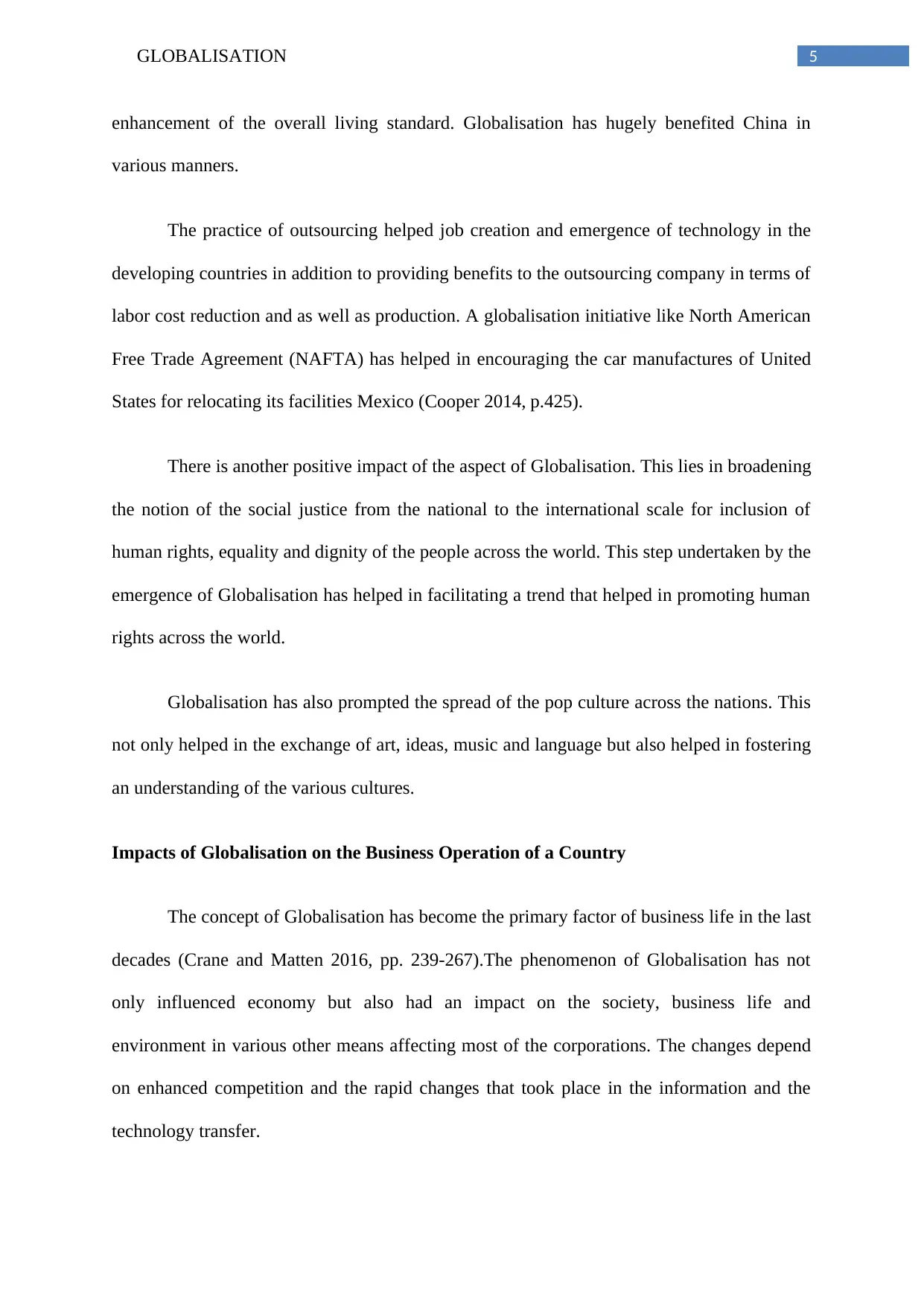
5GLOBALISATION
enhancement of the overall living standard. Globalisation has hugely benefited China in
various manners.
The practice of outsourcing helped job creation and emergence of technology in the
developing countries in addition to providing benefits to the outsourcing company in terms of
labor cost reduction and as well as production. A globalisation initiative like North American
Free Trade Agreement (NAFTA) has helped in encouraging the car manufactures of United
States for relocating its facilities Mexico (Cooper 2014, p.425).
There is another positive impact of the aspect of Globalisation. This lies in broadening
the notion of the social justice from the national to the international scale for inclusion of
human rights, equality and dignity of the people across the world. This step undertaken by the
emergence of Globalisation has helped in facilitating a trend that helped in promoting human
rights across the world.
Globalisation has also prompted the spread of the pop culture across the nations. This
not only helped in the exchange of art, ideas, music and language but also helped in fostering
an understanding of the various cultures.
Impacts of Globalisation on the Business Operation of a Country
The concept of Globalisation has become the primary factor of business life in the last
decades (Crane and Matten 2016, pp. 239-267).The phenomenon of Globalisation has not
only influenced economy but also had an impact on the society, business life and
environment in various other means affecting most of the corporations. The changes depend
on enhanced competition and the rapid changes that took place in the information and the
technology transfer.
enhancement of the overall living standard. Globalisation has hugely benefited China in
various manners.
The practice of outsourcing helped job creation and emergence of technology in the
developing countries in addition to providing benefits to the outsourcing company in terms of
labor cost reduction and as well as production. A globalisation initiative like North American
Free Trade Agreement (NAFTA) has helped in encouraging the car manufactures of United
States for relocating its facilities Mexico (Cooper 2014, p.425).
There is another positive impact of the aspect of Globalisation. This lies in broadening
the notion of the social justice from the national to the international scale for inclusion of
human rights, equality and dignity of the people across the world. This step undertaken by the
emergence of Globalisation has helped in facilitating a trend that helped in promoting human
rights across the world.
Globalisation has also prompted the spread of the pop culture across the nations. This
not only helped in the exchange of art, ideas, music and language but also helped in fostering
an understanding of the various cultures.
Impacts of Globalisation on the Business Operation of a Country
The concept of Globalisation has become the primary factor of business life in the last
decades (Crane and Matten 2016, pp. 239-267).The phenomenon of Globalisation has not
only influenced economy but also had an impact on the society, business life and
environment in various other means affecting most of the corporations. The changes depend
on enhanced competition and the rapid changes that took place in the information and the
technology transfer.
⊘ This is a preview!⊘
Do you want full access?
Subscribe today to unlock all pages.

Trusted by 1+ million students worldwide
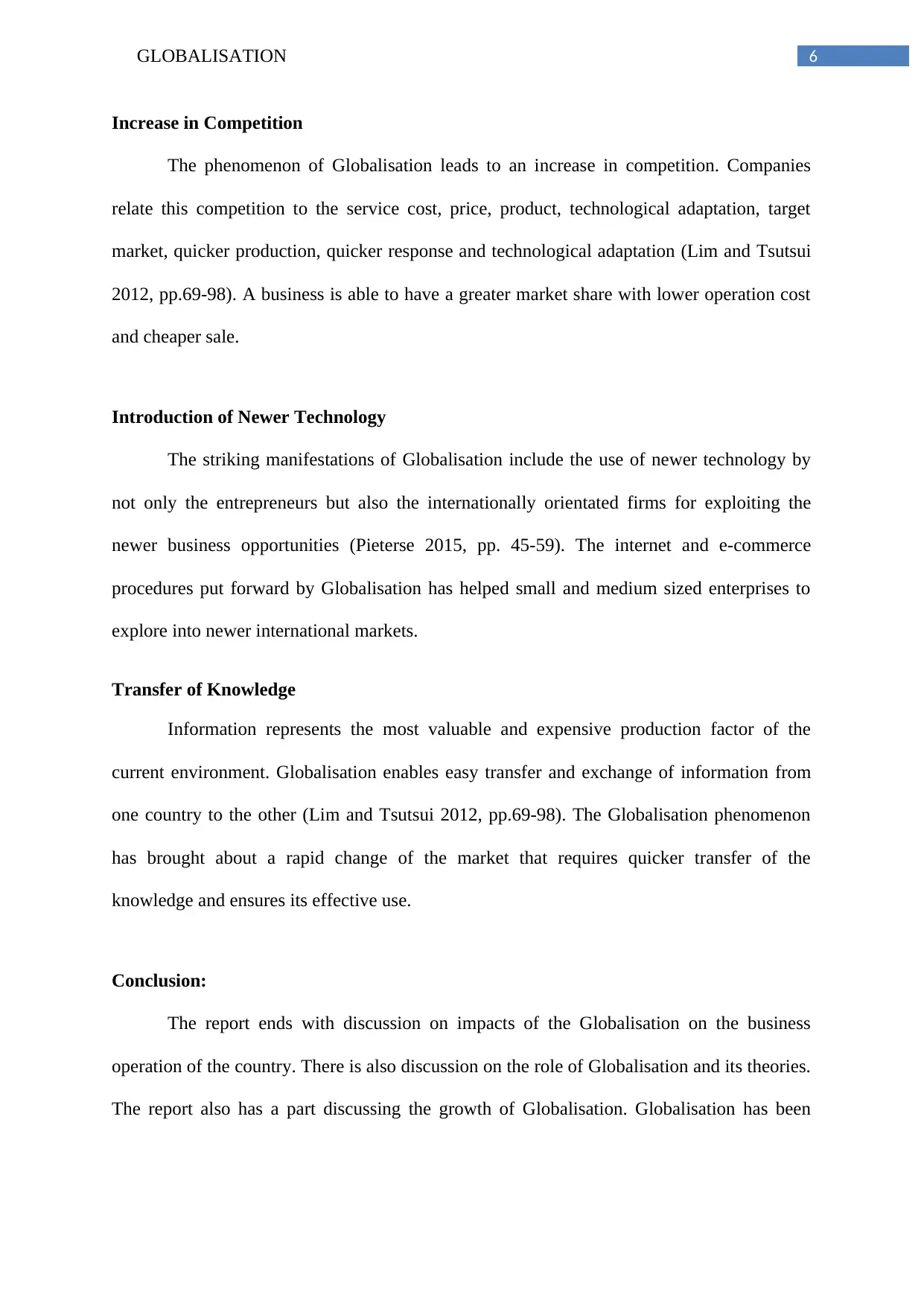
6GLOBALISATION
Increase in Competition
The phenomenon of Globalisation leads to an increase in competition. Companies
relate this competition to the service cost, price, product, technological adaptation, target
market, quicker production, quicker response and technological adaptation (Lim and Tsutsui
2012, pp.69-98). A business is able to have a greater market share with lower operation cost
and cheaper sale.
Introduction of Newer Technology
The striking manifestations of Globalisation include the use of newer technology by
not only the entrepreneurs but also the internationally orientated firms for exploiting the
newer business opportunities (Pieterse 2015, pp. 45-59). The internet and e-commerce
procedures put forward by Globalisation has helped small and medium sized enterprises to
explore into newer international markets.
Transfer of Knowledge
Information represents the most valuable and expensive production factor of the
current environment. Globalisation enables easy transfer and exchange of information from
one country to the other (Lim and Tsutsui 2012, pp.69-98). The Globalisation phenomenon
has brought about a rapid change of the market that requires quicker transfer of the
knowledge and ensures its effective use.
Conclusion:
The report ends with discussion on impacts of the Globalisation on the business
operation of the country. There is also discussion on the role of Globalisation and its theories.
The report also has a part discussing the growth of Globalisation. Globalisation has been
Increase in Competition
The phenomenon of Globalisation leads to an increase in competition. Companies
relate this competition to the service cost, price, product, technological adaptation, target
market, quicker production, quicker response and technological adaptation (Lim and Tsutsui
2012, pp.69-98). A business is able to have a greater market share with lower operation cost
and cheaper sale.
Introduction of Newer Technology
The striking manifestations of Globalisation include the use of newer technology by
not only the entrepreneurs but also the internationally orientated firms for exploiting the
newer business opportunities (Pieterse 2015, pp. 45-59). The internet and e-commerce
procedures put forward by Globalisation has helped small and medium sized enterprises to
explore into newer international markets.
Transfer of Knowledge
Information represents the most valuable and expensive production factor of the
current environment. Globalisation enables easy transfer and exchange of information from
one country to the other (Lim and Tsutsui 2012, pp.69-98). The Globalisation phenomenon
has brought about a rapid change of the market that requires quicker transfer of the
knowledge and ensures its effective use.
Conclusion:
The report ends with discussion on impacts of the Globalisation on the business
operation of the country. There is also discussion on the role of Globalisation and its theories.
The report also has a part discussing the growth of Globalisation. Globalisation has been
Paraphrase This Document
Need a fresh take? Get an instant paraphrase of this document with our AI Paraphraser

7GLOBALISATION
occurring at an unprecedented scope and pace. Globalisation has helped businesses with
information related to investment opportunities and economic trends.
occurring at an unprecedented scope and pace. Globalisation has helped businesses with
information related to investment opportunities and economic trends.
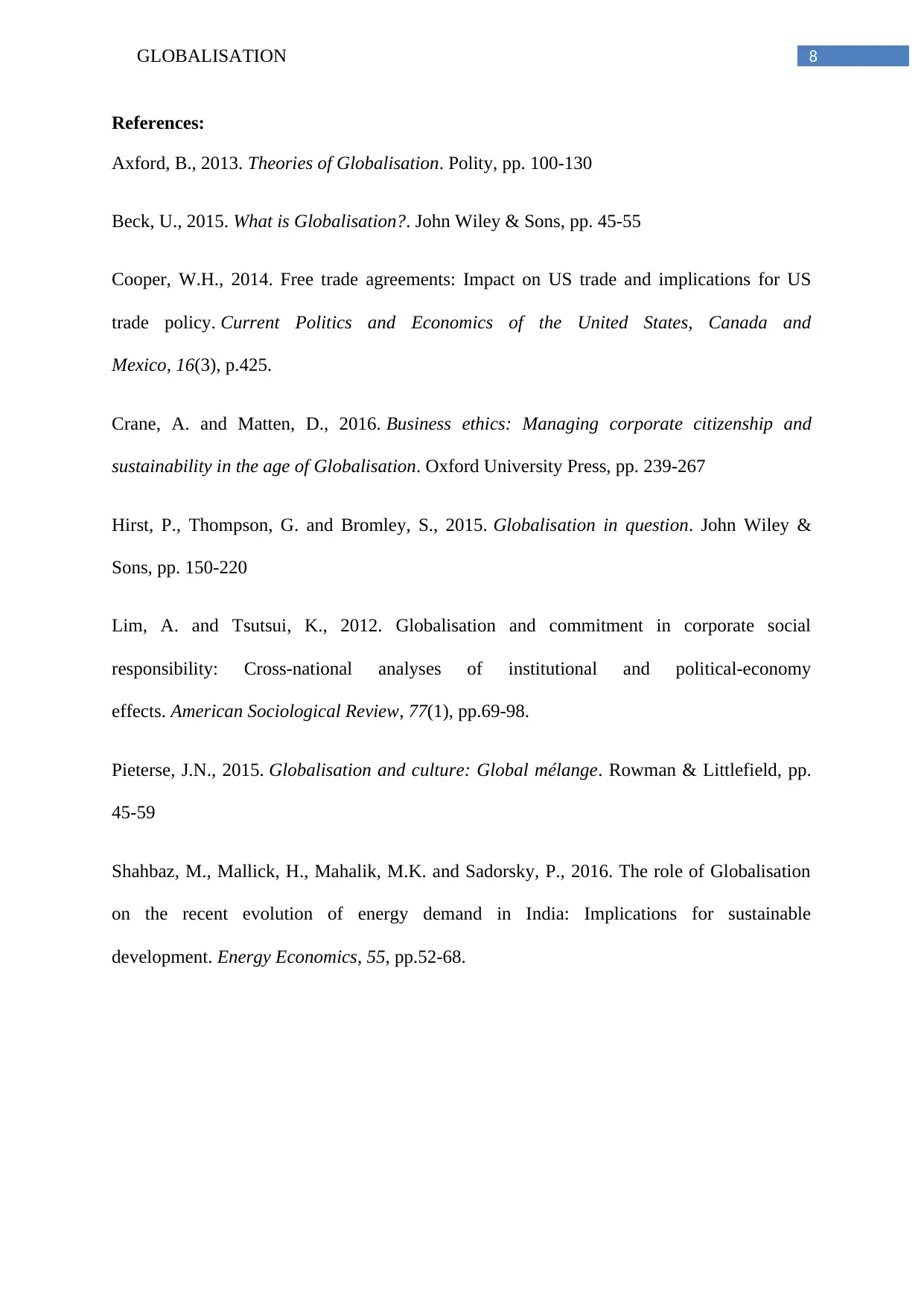
8GLOBALISATION
References:
Axford, B., 2013. Theories of Globalisation. Polity, pp. 100-130
Beck, U., 2015. What is Globalisation?. John Wiley & Sons, pp. 45-55
Cooper, W.H., 2014. Free trade agreements: Impact on US trade and implications for US
trade policy. Current Politics and Economics of the United States, Canada and
Mexico, 16(3), p.425.
Crane, A. and Matten, D., 2016. Business ethics: Managing corporate citizenship and
sustainability in the age of Globalisation. Oxford University Press, pp. 239-267
Hirst, P., Thompson, G. and Bromley, S., 2015. Globalisation in question. John Wiley &
Sons, pp. 150-220
Lim, A. and Tsutsui, K., 2012. Globalisation and commitment in corporate social
responsibility: Cross-national analyses of institutional and political-economy
effects. American Sociological Review, 77(1), pp.69-98.
Pieterse, J.N., 2015. Globalisation and culture: Global mélange. Rowman & Littlefield, pp.
45-59
Shahbaz, M., Mallick, H., Mahalik, M.K. and Sadorsky, P., 2016. The role of Globalisation
on the recent evolution of energy demand in India: Implications for sustainable
development. Energy Economics, 55, pp.52-68.
References:
Axford, B., 2013. Theories of Globalisation. Polity, pp. 100-130
Beck, U., 2015. What is Globalisation?. John Wiley & Sons, pp. 45-55
Cooper, W.H., 2014. Free trade agreements: Impact on US trade and implications for US
trade policy. Current Politics and Economics of the United States, Canada and
Mexico, 16(3), p.425.
Crane, A. and Matten, D., 2016. Business ethics: Managing corporate citizenship and
sustainability in the age of Globalisation. Oxford University Press, pp. 239-267
Hirst, P., Thompson, G. and Bromley, S., 2015. Globalisation in question. John Wiley &
Sons, pp. 150-220
Lim, A. and Tsutsui, K., 2012. Globalisation and commitment in corporate social
responsibility: Cross-national analyses of institutional and political-economy
effects. American Sociological Review, 77(1), pp.69-98.
Pieterse, J.N., 2015. Globalisation and culture: Global mélange. Rowman & Littlefield, pp.
45-59
Shahbaz, M., Mallick, H., Mahalik, M.K. and Sadorsky, P., 2016. The role of Globalisation
on the recent evolution of energy demand in India: Implications for sustainable
development. Energy Economics, 55, pp.52-68.
⊘ This is a preview!⊘
Do you want full access?
Subscribe today to unlock all pages.

Trusted by 1+ million students worldwide
1 out of 9
Related Documents
Your All-in-One AI-Powered Toolkit for Academic Success.
+13062052269
info@desklib.com
Available 24*7 on WhatsApp / Email
![[object Object]](/_next/static/media/star-bottom.7253800d.svg)
Unlock your academic potential
Copyright © 2020–2026 A2Z Services. All Rights Reserved. Developed and managed by ZUCOL.




